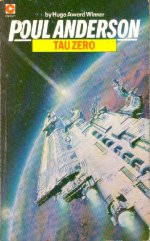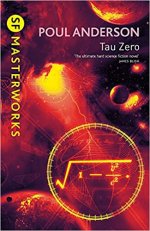Yes, Pete actually said they were receding from each other and never mentioned 'centre of mass' - only their relative velocity. I'm waiting to mark Pete's homework, at which point I will reveal my answer (or will have to revise it accordingly). 😉Galu, what is the correct answer to Discopete's question about two particles approaching each other at 2/3 lightspeed as observed by somebody at the centre of mass?
Don't you agree with the simple equation I supplied for the calculation?
I did read that link. Amazing. I mean the parts I can guess at.😀All that exists for a photon is the interaction that formed it and the interaction that destroys it.
In other words, nothing exists for a photon between being emitted by matter and being absorbed by matter.
That would mean that darkness can not exist for a photon.
OTOH, a youtube tutorial vid I just watched calculated how much time would have passed here on earth on my arrival back from accelerating away at G for ten years, decelerating for ten, then on return the same procedural way, so a 40 year journey. Wow
Let one of them have velocity v1=v, and the other velocity v2=-v.
The "usual" way to calculate their relative velocity is simply v relative = v1 - v2 = 2v
However, according to the theory of relativity:
v relative = [v1 - v2]/[1 - (v1*v2/c2)] = 2v/[1 + v2/c2] where c2 is the speed of light squared.
Now, apply that formula to your two objects and see what you get! 😉
I tried to follow that, but it is dimensionally inaccurate IMO.
You can't put v2/c^2 and expect it to make sense. 😕
I have been working with E^2 = p^2 x c^2 + m^2 x c^4 tonight.
It's p that is giving me the problem. Because it involves the Lorentz factor.
I used the Lorentz Velocity Transformation.

u = relative velocity
Since the magnitude of the receding velocities is the same:
u' + v = 2v, and, u'v = v^2
u = relative velocity
Since the magnitude of the receding velocities is the same:
u' + v = 2v, and, u'v = v^2
Sometimes the best strategy is to sleep on a problem.
Clearly no headway being made tonight. 😱
BTW, much improved image made of Orion and Canis Major made tonight. Also a more compact JPEG file.
You will notice I have included Beta Canis Majoris. A minor Cepheid variable. 😀
Clearly no headway being made tonight. 😱
BTW, much improved image made of Orion and Canis Major made tonight. Also a more compact JPEG file.
You will notice I have included Beta Canis Majoris. A minor Cepheid variable. 😀
Attachments
To be clear, you are making no headway tonight! 😉Clearly no headway being made tonight. 😱
Attached is the physics for the relative velocity of approach.
The only difference compared to the relative velocity of recession is that the + signs in the Lorentz Velocity Transformation become - signs.
Attachments
That may be because it is actually v^2/c^2, as I clarified in the post following the one which you quoted.You can't put v2/c^2 and expect it to make sense. 😕
If you get a 'wow' out of that, then you should enjoy 'Tau Zero' by Poul Anderson.OTOH, a youtube tutorial vid I just watched calculated how much time would have passed here on earth on my arrival back from accelerating away at G for ten years, decelerating for ten, then on return the same procedural way, so a 40 year journey. Wow
When a spaceship's Bussard ramjet engines run out of control, it continues to accelerate until it attains light speed. For the occupants on board subjective time slows down, but the universe outside ages rapidly - ultimately collapsing in a Big Crunch and being re-born in a new Big Bang.
The Cosmology regarding the ultimate fate of our universe may be out of date, but the book's a darned good read in the relativistic sense.
Tau Zero - Wikipedia
Attachments
Haven't come across this one, but I've read many of his novels. He's always been a good read.If you get a 'wow' out of that, then you should enjoy 'Tau Zero' by Poul Anderson.
When a spaceship's Bussard ramjet engines run out of control, it continues to accelerate until it attains light speed. For the occupants on board subjective time slows down, but the universe outside ages rapidly - ultimately collapsing in a Big Crunch and being re-born in a new Big Bang.
The Cosmology regarding the ultimate fate of our universe may be out of date, but the book's a darned good read in the relativistic sense.
Tau Zero - Wikipedia
The really wowee factor is not the 56000 year thing but say I want to come back to the future just 50 years later. How long would I have to travel then? A couple of weeks??If you get a 'wow' out of that, then you should enjoy 'Tau Zero' by Poul Anderson.
When a spaceship's Bussard ramjet engines run out of control, it continues to accelerate until it attains light speed. For the occupants on board subjective time slows down, but the universe outside ages rapidly - ultimately collapsing in a Big Crunch and being re-born in a new Big Bang.
The Cosmology regarding the ultimate fate of our universe may be out of date, but the book's a darned good read in the relativistic sense.
Tau Zero - Wikipedia
Now that's got to be doable, no?
There's one way to live for 150 years
There's a similar novel by Larry Niven:If you get a 'wow' out of that, then you should enjoy 'Tau Zero' by Poul Anderson.
When a spaceship's Bussard ramjet engines run out of control, it continues to accelerate until it attains light speed. For the occupants on board subjective time slows down, but the universe outside ages rapidly - ultimately collapsing in a Big Crunch and being re-born in a new Big Bang.
The Cosmology regarding the ultimate fate of our universe may be out of date, but the book's a darned good read in the relativistic sense.
Tau Zero - Wikipedia
A World Out of Time - Wikipedia
Correction: I should have said "it continues to accelerate until it approaches light speed."

Anderson's Tau Factor is the square root term in the above equation. When the speed of the spacecraft (V) approaches the speed of light (c) then the tau factor approaches zero.
As the tau factor approaches zero, the time (t') which elapses on the spacecraft will become smaller and smaller compared to the time (t) which elapses in the universe.

Anderson's Tau Factor is the square root term in the above equation. When the speed of the spacecraft (V) approaches the speed of light (c) then the tau factor approaches zero.
As the tau factor approaches zero, the time (t') which elapses on the spacecraft will become smaller and smaller compared to the time (t) which elapses in the universe.
Attachments
Time dilation is a fruitful field for sci-fi writers.There's a similar novel by Larry Niven:
A World Out of Time - Wikipedia
And yes, I'm a big Larry Niven fan. 😎
I'll leave it up to you to experiment with this calculator: Time Dilation Calculator...say I want to come back to the future just 50 years later. How long would I have to travel then? A couple of weeks??
If you scroll down, you can enter the percentage of the speed of light at which you are going to travel, and the distance you wish to travel in light years.
The calculator will then work out the journey times in years as viewed from the Earth and from the spaceship.
I realize after some thoughtful reflection that the shorter time you're gone the greater the acceleration has to be for their to result in a significant offset
Jet pilots are able to withstand around 8-9G?
So how much long term?
Jet pilots are able to withstand around 8-9G?
So how much long term?
Last edited:
Sorry, I don't see the significance of your question in relation to the topic of time dilation that we were just discussing. 😕Jet pilots are able to withstand around 8-9G?
So how much long term?
The time you would take to get to where you want to go would depend on the distance in light years you want to travel. That could take years, tens of years or hundreds of years! You would have all that time to accelerate to your near-light speed. We're not talking about simple non-relativistic jaunts to the Moon and back! Maybe you should take some time to use the calculator to which I linked.I realize after some thoughtful reflection that the shorter time you're gone the greater the acceleration has to be for their to result in a significant offset.
Last edited:
@ Discopete: Even if a Bussard ramjet could accelerate at a rate as high as 10 m/s^2, approximately 1G, it would take one year to attain 77% of light velocity.
To be clear, in the relativistic equation, v relative = 2v/[1 + v2/c2], the term in the brackets is [1 plus v squared divided by c squared].
I can't do the superscripts properly!
Galu, you are editing your posts so rapidly, I am losing track.... 😕
You mentioned the Lorentz velocity transform at some point.
Discopete was talking about two particles at 2/3 lightspeed relative to some central observer.
So v relative = 4/3 divided by 1 + 4/9
Which is 12/9 divided by 9/9 + 4/9 if I follow.
Which is 12/13.
Is that the answer?
- Status
- Not open for further replies.
- Home
- Member Areas
- The Lounge
- What is the Universe expanding into..



